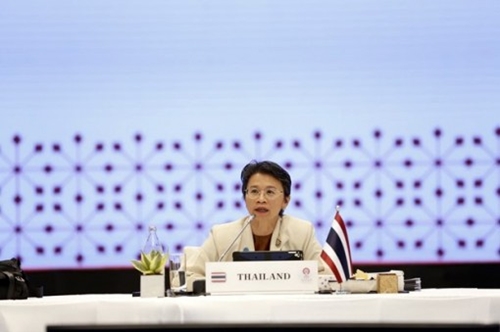She said during the meetings among ASEAN Member States and with its Dialogue Partners, Thai Prime Minister Prayut Chan-o-cha highlighted the importance of public health cooperation, in particular on vaccine security, and the need to promote regional stability that is conducive to economic recovery.
    |
 |
|
Ambassador/Permanent Representative of Thailand to ASEAN Phasporn Sangasubana |
He also reiterated Thailand’s commitment to strengthen cooperation with other ASEAN Member States and relevant partners to enhance human security, including in the areas of universal health coverage, human capital development, and sustainable development, in order to truly realize a people-centered ASEAN Community that leaves no one behind.
Regaridng ASEAN’s achievements this year, Phasporn said in order to cope with the spread of COVID-19 and alleviate its economic impacts as well as to build back better, ASEAN began working almost immediately after the detection of the first case of infection.
Following the Special ASEAN Summit on COVID-19 and the Special ASEAN Plus Three Summit on COVID-19 on April 14, ASEAN set up the COVID-19 ASEAN Response Fund and the ASEAN Regional Reserve of Medical Supplies.
“We adopted the ASEAN Comprehensive Recovery Framework and its Implementation Plan, and most recently the ASEAN Declaration on an ASEAN Travel Corridor Arrangement Framework. We also established the ASEAN Center for Public Health Emergencies and Emerging Diseases and finalized the ASEAN Strategic Framework on Public Health Emergencies,” he added.
However, she noted that ASEAN’s key performances this year do not limit to those related to COVID-19. The Regional Comprehensive Economic Partnership or RCEP was signed yesterday on 15 November 2020. It is now the largest free trade agreement and its early implementation can help increase strategic value for ASEAN in global trade and investment.
According to the ambassador, the signing of RCEP will help mitigate the impacts of COVID-19 on ASEAN economies and accelerate our recovery. It also attests to ASEAN’s resolve to advance regional economic integration and commitment to a free and open multilateral trading system.
“Thailand expects the RCEP to re-invigorate regional trade and investment, restore the much-needed business confidence, and demonstrate to the world that our market is ready to rebound,” she stated.
Assessing Vietnam’s ASEAN chairmanship role, she said the country, as the current Chair of ASEAN, has quickly adapted to the changing circumstances amidst the COVID-19 pandemic by conducting virtual, instead of face-to-face, meetings throughout the year. Not only has this ensured that important deliverables can be achieved according to plan, but also enabled ASEAN to continue engagement among ourselves and with partners.
Following the success of Vietnam’s initiative to hold the ASEAN Summit on COVID-19 and the Special ASEAN Plus Three Summit on COVID-19, ASEAN has held a number of high-level meetings to exchange information and foster cooperation to address the pandemic, including with the EU, the US, Australia, and the UK, she added.
Regarding the challenges and opportunities facing ASEAN in the coming time, Phasporn said the current global political economy presents a complex set of policy decisions for governments around the world. “We have witnessed the intensifying tensions between major powers partly exacerbated by the pandemic. With the regional economy projected to contract by 3.8 percent in 2020, it is important to preserve regional stability in order to create an environment conducive for tackling the COVID-19 pandemic and for economic recovery,” she said.
Given this context, the spirit of “cohesive and responsive” ASEAN is needed now more than ever. ASEAN needs to be “cohesive” and stand firm in its belief in multilateralism and regionalism while maintaining its centrality in the regional architecture with emphasis on Mutual trust, Mutual benefit, and Mutual respect,” the diplomat stressed.
The ASEAN Outlook on the Indo-Pacific should be used a tool to encourage major powers to constructively interact with ASEAN Member States in order to promote the region’s sustainable socio-economic development, she concluded.
Source: VNA